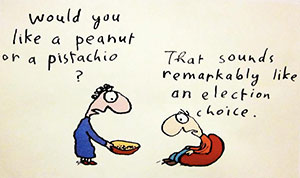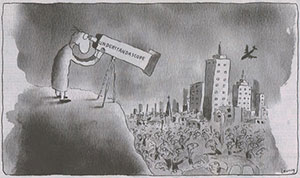As originally suggested in Rethinking the Vote (see Further Reading below) and then expanded by other authors, this seemingly minor change is suggested as improving the deliberative and comparative component of voting.
The emphasis on home voting potentially sees voters armed with quite different sets of materials ranging from a short precis of candidates positions, through to recommendations from Citizens’ Panels (discussed elsewhere among the Alternatives) and less subject to sloganeering and pamphleteering – that is, their decision becomes more reasoned and deliberative.
Where the process is conducted online, it is reasonable to suggest a dramatic reduction in cost for government to conduct an election. More importantly, the reduction in costs of candidacy (through the capacity for electronic distribution of messaging and policy position information electronically linked to the online ballot) may deliver a substantive improvement in delivering on the ideals of democracy as a contest of ideas.
Interestingly, despite strict limitations as to pre-poll voting, in NSW the Electoral Commission notes a rapid upward trend over recent elections: in 2004 there were 132,465 votes, in 2007 this increased to 223,266, and in 2011 the figure was further escalated.
Advantages of these Reforms
The key advantage is that the voter is not subject to the “going out of business sale” gauntlet of pamphleteering found at polling places. Moreover, with the time constraint of voting removed the voter has the chance to learn more about the candidates being preferenced and can make their own decision. A voter spending just 10 minutes to read 150 words per candidate in a local government election would represent a greater level of engagement for most citizens.
Reduction in cost of candidacy (at all levels of government) is an ideal worthy of pursuit if we seek to achieve a greater measure of descriptive representation among our elected representatives.
Arguments Against these Reforms
“Abusive men are going to fill in the ballots of their wives and aged parents – this is a step backward!”
The central concern of fraud and coercion has a great deal of validity. Polling places are protected by law and provide a high degree of security and public confidence. Arguments can be made that in some household environments the freedom of the vote may be compromised by a dominant or abusive individual in the household and these are challenging to manage. However, the one counterpoint to consider is that with absentee voting this is already technically possible to the extent that a spouse cares to abuse the ballot.
“The internet can’t be trusted – an election can be cheated and there won’t be any record.”
Consumer acceptance and trust in web-based technology is best demonstrated by citizens’ use of online banking, and we use this as the barometer of public acceptance. The experience of online banking demonstrates that barriers of trust, authentication of identity and scale have been overcome. Critically, and recognising that an election may provide a tempting target for those with ill-intentions, the Foundation will solicit trials at a local government level which may be fairly suggested carry less profile as a target than a State or Federal election.
Background and Origins
The Crigler book referenced below is one of the first to note the value of home voting for a value beyond facilitating those unable to attend a polling place.
Questions for Further Study
When a pilot study is undertaken, the key item of reference would be to explore the extent to which voters deviate from party-distributed How to Vote (HTV) information, and whether they did so in a different proportion to traditional voters who attend a polling place for elections at similar times.
What You Can Do
Given the complexity and nuances involved in doing this on a wide scale, it has been expressed to us that trial at a local government level is a preferred starting point. We would be happy to meet with Mayors and General Managers to identify if their community may find this an interesting pilot project to explore. It should be noted that in the first instance online options will be offered on an optional and complementary basis to traditional paper based voting.
Clarifications
None yet requested.
Further Readings
- Crigler, A., Just, M.R., & McCaffery E.J. Rethinking the Vote Oxford University Press, 2004. Buy it online (Free Shipping Worldwide)
- Parliament of NSW Joint Standing Committee on Electoral Matters Administration of the 2007 NSW Election and Related Matters Report No. 1/54 May 2008



